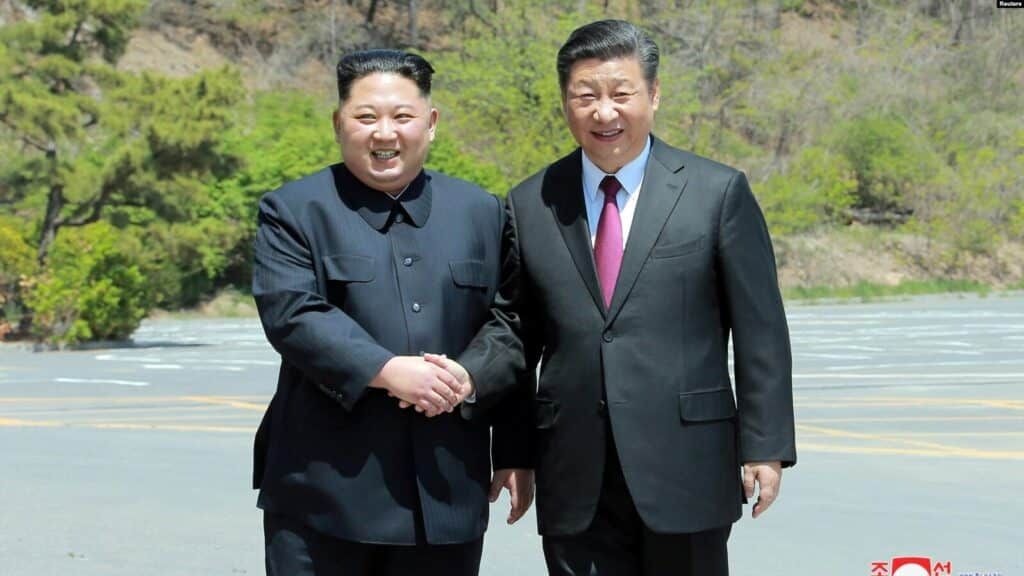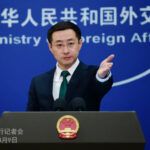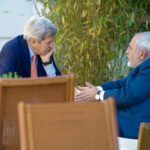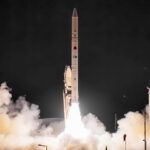To sanction North Korea, sanction those that won’t—Russia and China
By Aaron Arnold | July 14, 2022
 North Korean leader Kim Jong Un met with China's President Xi Jinping, in Dalian, China in May 2018 (Image North Korea's Korean Central News Agency)
North Korean leader Kim Jong Un met with China's President Xi Jinping, in Dalian, China in May 2018 (Image North Korea's Korean Central News Agency)
To ratchet up pressure on North Korea, it is time to hold Russia and China accountable for failing to implement their international sanctions obligations.
According to recent South Korean and US intelligence estimates, North Korea is making preparations to conduct its seventh nuclear test, which would be its first test since September 2017. While tougher international sanctions followed such provocations in the past, it is unlikely that the UN Security Council will find a consensus to adopt new sanctions this time. Not only have China and Russia failed to implement their sanctions obligations, but they have also actively worked to undermine the UN sanctions regimes.
China and Russia’s sabotage. In the nearly five years since the Security Council last imposed new sanctions, both Russia and China have stymied even the most modest of efforts to update and amend international sanctions against North Korea. Last month, both countries vetoed a resolution put forward by the United States that would have further tightened sanctions on North Korea in response to the country’s continued provocations and ballistic missile tests. China’s Foreign Ministry spokesman, Zhao Lijian, hinted at China’s unwillingness to seek new sanctions should North Korea conduct another nuclear test, noting that “sanctions won’t help solve the problem” and that “[t]he US should adopt some visible measures instead of merely paying lip service so that the two sides could meet each other halfway.”
Since 2006, the UN Security Council has adopted a range of targeted and trade-based sanctions aimed at North Korea’s ballistic missile and nuclear weapons programs. Initially, the sanctions targeted the country’s political elites and organizations within the country’s military-industrial complex that played a direct role in advancing its ballistic missiles and nuclear weapons. Over the past 15 years, the Security Council has progressively restricted North Korea’s access to international banking, trade, and commerce—even capping the number of refined petroleum products North Korea can import to 500,000 barrels per year.
With few exceptions, like humanitarian aid, North Korea is effectively cut off from global financial markets, trade, and commerce. Countries are prohibited from maintaining representative offices of North Korea’s banks, must repatriate North Koreans living abroad, and are barred from forming joint ventures. Yet, despite these restrictions and others, North Korea continues to evade sanctions and generate revenue for its ballistic missile and nuclear weapons programs. This happens all while over 40 percent of the country’s population suffers from chronic malnutrition and requires humanitarian assistance—a situation growing increasingly grim since the coronavirus outbreak.
The most recent round of sanctions adopted by the Security Council came in September 2017, just after North Korea conducted its sixth nuclear test, which US intelligence estimated had a yield of nearly 140 kilotons—enough energy to vaporize a city the size of Boston.
This year alone, North Korea has conducted 18 missile launches. Of those, two have been of the intercontinental ballistic missile (ICBM) type—missiles capable of reaching parts of the United States. In January, North Korean leader Kim Jong Un tested a new “hypersonic missile,” which analysts have described as “a potential major upgrade in North Korea’s striking power against its nearby adversaries.” Furthermore, the most recent UN Panel of Experts’ report has described the country’s progress as “a marked acceleration of the testing and demonstration of new short and possibly medium-range missiles.”
Russia and China veto tightened sanctions. In response to North Korea’s ICBM tests and continued provocations, the United States proposed to tighten international sanctions, including further reductions in North Korea’s import cap on refined petroleum, targeted sanctions against the country’s elite hacking units, and further restrictions on importing/exporting certain commodities. Both Russia and China vetoed the proposal—for the first time since 2006.
China’s UN Ambassador, Zhang Jun, claimed that sanctions have not brought North Korea to the negotiating table and blamed the United States for stalled talks. Zhang also called for lifting international sanctions against North Korea due to the humanitarian crisis unfolding in the country. But he did not mention the North Korean regime’s diversion of scarce resources to its nuclear weapons and ballistic missile programs.
After the vote, US Ambassador to the United Nations, Linda Thomas-Greenfield, called the Chinese veto, “an unthinkable abdication of [China’s] responsibilities to the Council and to protecting international peace and security.”
Ineffective sanctions regime. Some argue that international sanctions against North Korea are ineffective because the country has yet to denuclearize. But this assumes that UN member states implement sanctions effectively, which is far from the case.
One reason why countries struggle with implementing sanctions on North Korea involves technical guidance from the UN Security Council’s 1718 Committee (the committee responsible for the sanctions regime against North Korea)—guidance that is often absent or lacking. In recent years, political disagreements between the permanent members of the Security Council have often resulted in such a lack of guidance. It was only recently, for example, that the committee was able to find a tentative agreement on a conversion rate between barrels of oil and metric tons of oil. This seems like an esoteric problem, but it often prevented the Panel of Experts from making definitive statements about North Korea’s breach of the oil cap. (Under the current international sanctions regime, North Korea is permitted to import only 500,000 barrels of refined petroleum per year.)
Of course, politics have hurt sanctions implementation, too. Much if not most of North Korea’s sanctions-evading activities—including its efforts to generate revenue that supports its ballistic missile and nuclear weapons programs—involve China and Russia. While geographic proximity and historical political and economic ties can explain part of this sanctions-evading activity, there is no denying that both Russia and China have systematically sought to undermine the sanctions regime.
Since North Korea’s last nuclear test in 2017, Russia and China have been the only dissenting voices in the Security Council and 1718 Committee—blocking even the most modest of proposals. More, both countries actively worked against the UN Panel of Experts to undermine ongoing investigations into sanctions evasion.
The UN Panel made repeated inquiries to Chinese authorities over alleged North Korean sanctions evasion. In several cases, the panel provided satellite imagery of North Korean vessels off-loading coal to China-flagged vessels—sometimes within yards of Chinese law enforcement vessels. China denied those reports, replying that it “faithfully implements” its international obligations.
While Russia and China are the most egregious sanctions violators, other countries have also failed to uphold their international obligations. In some cases, the jurisdictions simply lack the resources and capacity to coordinate the expansive sanctions regimes placed on North Korea.
North Korea’s illegal activities. In June, the Financial Action Task Force—the international organization created by the Group of Seven economically advanced countries (often known simply as the G7) and responsible for setting anti-money laundering standards—released a report on the state of global efforts to tackle money laundering, terrorism, and proliferation financing. The report, a first of its kind by the organization, found that most member countries still had significant deficiencies when it came to implementing the asset freeze provisions found within international sanctions. Whereas 66 percent of high-income countries were assessed as “compliant” or “largely compliant” with sanctions provisions, that number drops to 11 percent for low-income countries—especially those located in West and Sub-Saharan Africa, as well as parts of East and Southeast Asia. These are “hot spot” regions for North Korea’s sanctions-evasion activities.
Other countries have taken a page from China’s playbook by simply ignoring (or denying) North Korean activities in their jurisdictions. Senegal, for example, continues to allow North Korean workers within its borders, despite media articles and mentions within the UN Panel of Experts’ report about the activities.
Further compounding this problem: Many of North Korea’s revenue-generating activities increasingly take place in the virtual world. The US Federal Bureau of Investigation attributed the largest ever crypto hack to North Korea—a March 2022 heist that netted the country nearly $600 million of digital assets. The US State Department issued an advisory detailing how North Korea sends laborers overseas to generate revenue for the Kim regime by providing mobile app and web development services. The revenue generated, as much as $300,000 annually per worker, directly feeds into North Korea’s ballistic missile and nuclear weapons programs.
Regardless, Russia and China remain the financial hubs for North Korea’s sanctions-evading activities. In its 2021 report, the Panel of Experts detailed several instances of North Korean banks operating inside China and Russia, in apparent violation of international sanctions. In one particularly egregious case, Beijing, in its reply to an official inquiry, informed the Panel that “its competent authorities had listed the designated individuals as being forbidden to enter or transit through China and had requested Chinese banks and financial institutions to freeze their assets.” This denial came despite Beijing officials being presented with evidence that the individuals in question continued to operate in the city. In another case, the Panel provided evidence to Moscow, including transaction details and account numbers, of a North Korean front company acting at the behest of its national bank. Since the individual involved was an accredited diplomat, Russia refused to take any action.
What is to be done? In the absence of definitive action by the Security Council, at a minimum, the United States, the European Union, and the United Kingdom should coordinate sanctions against the maritime vessels, individuals, and companies that the UN Panel of Experts recommend for designation. For the most part, the United States already does this. But to shore up gaps, closer cooperation with the United Kingdom and the European Union will be necessary. Doing so will also bring greater awareness to the scale and scope of North Korea’s sanctions-evading activities.
And if Western countries are serious about their international nuclear nonproliferation commitments, they must hold Russia and China accountable for failing to uphold theirs. Russia and China’s abrogation of responsibility should be met with secondary sanctions against their domestic institutions if they turn a blind eye to North Korea’s sanctions-evading and revenue-generating activities.
As a start, the United States should impose secondary sanctions against the Chinese and Russian regional banks and state-owned enterprises that continue to support North Korea. There is precedent for such actions. In 2012, for example, the United States imposed secondary sanctions on China’s Bank of Kunlun for its role in providing financial services to Iran. The bank was ultimately cordoned off from the international financial system.
The stark reality is that the lifeline China and Russia provide to North Korea sustains the country’s nuclear ambitions and prevents any peaceful resolution of the ongoing crisis sparked by its nuclear program.
Together, we make the world safer.
The Bulletin elevates expert voices above the noise. But as an independent nonprofit organization, our operations depend on the support of readers like you. Help us continue to deliver quality journalism that holds leaders accountable. Your support of our work at any level is important. In return, we promise our coverage will be understandable, influential, vigilant, solution-oriented, and fair-minded. Together we can make a difference.
Keywords: China, North Korea, Russia, UN Security Council, nuclear testing, nuclear weapons, sanctions
Topics: Nuclear Weapons















The Bulletin writes, “over 40 percent of the country’s population suffers from chronic malnutrition and requires humanitarian assistance—a situation growing increasingly grim since the coronavirus outbreak.” And yet it calls for further tightening the screws on the people of North Korea. I am shocked by the utter inhumanity present in this article. But given the political tone of the article, which ignores completely the role the US plays in threatening North Korea with nuclear annihilation and among other assaults flies nuclear-capable bombers to the border of North Korea, maintains huge military bases in South Korea aimed at the North and… Read more »
Why do you think KJU would support his civillan population if the UNSC lifted sanctions? KJU prioritises his WMD and nuclear weapons programme over his people. Nearly 40% of his country is starving and he spends what little cash they have on missiles. But sure, “the inhumanity”. Get real.
no, you get real. where has sanctions ever worked? sanction’s only hurt the citizens of a nation. do you really believe that kju is suffering due to sanctions? what happened to some other nations that agreed to stop wmd programs? libya, (the richest and most advanced country in africa) and iraq were bombed into the stone age and their leaders murdered that’s what. these sanctions against russia are bringing them to their knees right? LOL. looks more like they are bringing the u.s. and the eu to their knees. russia is doing just fine, the ruble was declared by bloomberg… Read more »
It’s disappointing to see the Bulletin publish articles written by such vulgar warmongers. I expected better.
since when did the bulletin join the corporate media propaganda club? i haven’t read anything from this magazine for a long time but back in the late 70s i had a subscription. most articles then were attempts to turn back the clock, not move it forward like this author is trying to do. doesn’t this warmonger see the damage the russian sanctions are doing around the world while russia’s oil revenue has increased 50% over last year and the ruble has been declared by bloomberg to be the worlds best performing currency this year? the u.k. is already dipping into… Read more »